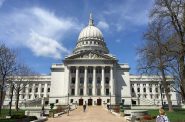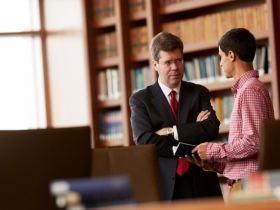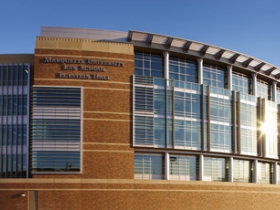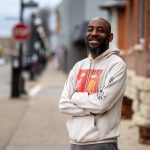The Rise of MU Law School
How it became the state's leading pollster and a high profile place for public forums.
On Thursday the front-page headline for the Milwaukee Journal Sentinel was one word, “Tossups,” in oversized type, touting two new polls showing the races for president and U.S. Senate in Wisconsin were both essentially tied. It was great copy for the newspaper, an electoral drama delivered on a platter by the Marquette Law School, whose polling operation goes to great lengths to serve the media. As Dean Joseph Kearney has declared, while “most pollsters report the data once and move on to the next poll, we will ask the news media: ‘What else would you like to know?’ And we will answer it for them based on the data.”
It’s all part of Kearney’s strategy to heighten the law school’s image while broadening its outreach to the community. He hired highly regarded broadcast journalist Mike Gousha to handle public forums with politicians, authors and community activists. He hired former Journal Sentinel education reporter Alan Borsuk to put together education (K-12) forums and edit Marquette Lawyer magazine. And he has brought in UW-Madison political science professor Charles Franklin, a nationally known expert and co-founder of Pollster.com, to do the law school’s polls, which quickly gave MU the most important polling operation in Wisconsin.
As a result, the law school has become a hugely influential player in the political dialogue in this state. Gousha’s adroit handling of the debate between Tom Barrett and Scott Walker in the recall election, for instance, made the MU-sponsored debate by far the most incisive and informative one.
Just as impressive, the law school has greatly increased its commitment to providing pro bono help for those who can’t afford legal assistance. It now runs four different legal clinics, including two in inner city locations (one on the North Side, one on the South Side) serving about 800 clients per year. More than 40 percent of students qualify for membership in the Law School’s Pro Bono Society by performing at least 50 hours of free legal service by graduation.
Kearney will at least describe his legal philosophy and offers blessedly plain words: “judicial conservative.” He clerked for judges of a similar persuasion, first for Judge Diarmuid F. O’Scannlain, of the U.S. Court of Appeals for the Ninth Circuit and then for the big daddy of conservatism, U.S. Supreme Court Justice Antonin Scalia. Yet he seems intent on embracing the spectrum of legal philosophies, generating criticism for hiring former U.S. Senator Russ Feingold, a liberal who is pro-choice, as a visiting law professor.
“He is a man of principle in terms of giving people their voice across the spectrum,” says Milwaukee attorney Walt Kelly, who ran unsuccessfully for the Wisconsin Supreme Court in 1997.
Kearney’s mentor was his predecessor as dean, the late Howard Eisenberg, who hired Kearney as a law professor though he had no teaching experience at the time. Eisenberg was passionately committed to the idea that a law school should be actively engaged in the community and region, Kearney says, adding that “his personal commitment to pro bono work was unparalleled in my experience.”
But perhaps the most important help Eisenberg provided was a deal he struck with then MU President Robert Wild which allows the law school autonomy with respect to its budget, meaning it can capture all the revenue from donations by law school alumni. Little was being raised under Eisenberg, but under Kearney the Annual Fund has steadily grown: last year some 1,436 donors provided gifts and pledges totaling $2.5 million.
That gives Kearney the money to pay for things like a year’s worth of state-of-the-art polls, which reach out to cell phone users, and undoubtedly will cost the school hundreds of thousands of dollars. Franklin is on leave from UW for 2012. Kearney says the school hasn’t decided how much polling, if any, it will do in 2013, but leaves the clear impression this will continue to be something the school emphasizes.
Gousha has been doing 15 to 20 forums a year for MU, with a wide range of guests, from authors like John Lewis Gaddis (who wrote a biography of diplomat and Milwaukee native George F. Kennan) to journalists like Judy Woodruff of PBS or Joan Biskupic of USA Today to local leaders like Baseball Commissioner Bud Selig, urban farming theorist Will Allen or business leader Jeff Joerres. And of course, there have been lots of interviews with top lawyers, from Supreme Court Justice Elena Kagen to U.S. Attorney James Santelle and federal judge Diane Sykes.
“I think these forums are a welcome addition to the public discourse in the community,” Kelly says. “They present for the most part very well informed commentary and guests.”
The law school has an impressive new showcase for these forums, the $85 million Ray and Kay Eckstein Hall, a 200,000 square foot facility that Kearney has declared met his goal “to construct the best law school building in the country.”
For those who know the history of Marquette University which, until the mid-1960s was plagued by debt and hurt by a lack of alumni support, it’s stunning to see how the campus has grown new buildings in the last few decades. The law school, too, has clearly seen its funding grow, which has made Kearney’s uniquely ambitious agenda possible. There can’t be too many law schools in America with their own pollster and an expert on K-12 educational innovations on staff.
Kearney has taken Eisenberg’s vision of a law school engaged in its community and put it on steroids, though its mission remains a search for truth through a clash of ideas. As Kearney puts it, “a law school is especially well suited, even dedicated, to addressing disagreements fairly and through civil discourse.” Of late, in red-and-blue state America, there hasn’t been a lot of such discourse to be found.
Short Takes
-While Marquette was rising as top pollster, the longtime polling operation at Wisconsin Policy Research Institute has greatly declined, as my earlier column explained.
-The only example I could find of the ever-measured Kearney saying anything the least bit controversial was in his long (eight page) scholarly explanation of the law school’s public polling initiative, where he wrote that “much of the state seems suspicious (if not openly hostile to) Milwaukee.” Speaking as editor of a publication dedicated to the city, its nice to see the town’s law school address an obvious challenge for Milwaukee.
–Joan Biskupic, by the way, is the sister of former U.S. Attorney Steve Biskupic and former Outagamie County D.A. Vince Biskupic. But it must be said that their sister has outdone them, with acclaimed biographies of Supreme Court justices Scalia and Sandra Day O’Connor.
Murphy's Law
-
Is Legislature Biased Against Working Class?
 Apr 4th, 2024 by Bruce Murphy
Apr 4th, 2024 by Bruce Murphy
-
Associated Press Will Decline in Wisconsin
 Mar 27th, 2024 by Bruce Murphy
Mar 27th, 2024 by Bruce Murphy
-
City Attorney Race Is Vitally Important
 Mar 25th, 2024 by Bruce Murphy
Mar 25th, 2024 by Bruce Murphy



















They are a great addition to the political scene.
The public discourse in the Law School at the Marquette Interchange has been valuable, balanced and informative. The Law School is also providing leadership in founding and housing the National Sports Law Institute in 1989 which is hosting its annual meeting focusing on “Current Legal and Business Issues Afferting International Professional Sports” on October 19, 2012 in Ekstein Hall. This meeting attracted a national and international program and audience. The Bruce Murphy article was nicely and appropriately done. Joe Kearney and his team have done a great job in our community.
One token liberal does not make for a balanced approach. Look at all the others invited to Marquette. They are all part of the elite and mostly conservative. The Dean is doing good things, but liberal thought and issues are not being discussed at Marquette.
Maybe this will increase that #96 ranking and get that grads employed above 51%.
As a current student, I welcome Dean Kearney’s efforts to improve the prestige and relevance of the institution, as well as the value of the degree I will receive in a couple of years. This article is aptly titled; Marquette is on the rise.
My experience is that the politics I encounter are balanced and across the spectrum. This goes for students and professors. Nevertheless, politics doesn’t take center stage. The law and legal education do. What I have experienced is open discussion of the law – past and present – and a balanced approach to historical, legal, and public policy concerns.
I know that the law doesn’t operate in a vacuum apart from politics, and neither does Marquette Law School. There is enough liberalism and conservatism that those perpetually looking to feel as if there is too much of the opposite side will have plenty to feed their concerns. That provides plenty to talk about, and talk we do. The very architecture of Eckstein Hall calls us to open and civil discourse. Other buildings have an atrium or a lobby. We have the Zilber Forum. This, by the way, is just one of many great features in a building is both the capstone of past efforts, and the cornerstone of future endeavors.
This is a great time to be a (present or future) Marquette Lawyer.
I feel as though you ran this profile once before…
Hey Bill, I’ve never profiled Kearney before, including in my days at Milwaukee Magazine.
I’m proud to be an alumnus and thankful for the opportunity to attend. But, I have to agree with Jake. I’m looking forward to the article that discusses significant metric improvement in ranking or grad hire rate or tuition inflation control. (It’s doubled since I graduated 10 years ago). As someone who lives outside the state of WI, I just don’t see the ROI on these initiatives. Is a firm or corporation going to hire a Marquette grad because s/he saw an MU poll or because s/he saw an interview conducted by an employed journalist?
This is great to show what MU law is doing.especially important in a election year. This keeps the MU name out in front of the public.